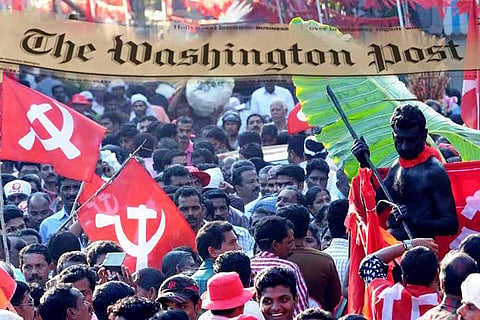On Washington Post's front page, Kerala takes centre stage as 'a Communist success'
It seems that Kerala under the CPI (M) is the flavour of the season. As a debate rages back home, with the Communists cocking a snook at the BJP over President Ram Nath Kovind praising the state as the “global face of India”, even the global press is curious over the phenomenon of a democratic Communist government.
On Sunday, the Washington Post dedicated much of its front page to a descriptive essay by Greg Jaffe and Vidhi Doshi, on Kerala as “one of the few places on earth where a communist can still dream.”
The article talks about how the CPI (M) has found unexpected success in Kerala by moving away from mainstays of Communist practice in other countries such as revolution and the seizure of factories and other “means of production”.
It maps an interesting journey, with curious nuggets for those unfamiliar of the CPI(M)’s history in the state. For instance, it talks of how a musical play Neengalennai Communistakki (You Made Me a Communist) played a big role in popularising Left thinking in the 1950s and helped the Communists to their first electoral victory in 1957.
The article puts Kerala Finance Minister Thomas Isaac at the centre of it, tracing the story of the lifelong Communist who began his political journey by picketing his own father’s factory. “If you don’t negotiate with these workers, I will be with them on the picket line,” the article quotes him as recalling saying to his father.
The major successes of the state under Communist rule – the 95% literacy rate and the premium healthcare system that caters to all rungs of society – are, of course, highlighted. But the article also points out some of the contradictions that have arisen out of the expatriate opportunities that have opened up for “millions of healthy, educated workers setting off to the supercharged, capitalist economies of the Persian Gulf dreaming of riches and increasingly finding them.”
So, the article points to the phenomenon of “gulf houses”, massive homes built across Kerala with money earned overseas. These houses remain empty and locked for most of the time, as their expat owners work abroad, even as there is a drastic shortage of housing for the poor, the article says. It also talks about the massive fiscal deficit the state has, despite the massive remittances that come from the Gulf.
The Washington Post article comes at a time when Kerala’s successes and failures are the subject of hot discussion, thanks to a major push by the BJP to secure a toehold for itself in the state. A constant war of words has been on between the BJP and the CPI (M).
The major controversy has been around the ever-growing series of political killings of BJP and RSS workers on one side, and CPI (M) activists on the other, with each side blaming the other. But the BJP has also attempted to take on the CPI (M) on its development record.
PM Modi, for instance, compared Kerala to Somalia last year, claiming that the rate of infant mortality among Kerala’s Scheduled Tribes population was abysmally low. In return, Keralites kicked off a Twitter trend with the hashtag #PoMoneModi. More recently, another battle emerged when Uttar Pradesh Chief Minister joined the BJP’s padayatra this month in Kerala. While the CPI (M) took digs at the UP CM for the death of infants in UP hospitals, Adityanath hit back at the Kerala government over its record of dengue deaths this year.

